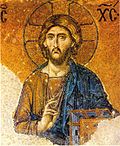- Church of Antioch
-
Part of a series on Eastern Christianity 
History Orthodox Church History
Specific regions:
Byzantine Empire
Ecumenical council
Christianization of Bulgaria
Christianization of Kievan Rus'
East-West Schism
Asian Christianity
Coptic Egypt · UkraineTraditions Orthodox Church
Others:
Oriental Orthodoxy
Ethiopian Tewahedo Church
Coptic Church
Church of the East
Eastern Catholic Churches
Syriac ChristianityLiturgy and worship Sign of the cross
Divine Liturgy
Iconography
Asceticism
OmophorionTheology Hesychasm · Icon
Apophaticism
Filioque clause
Miaphysitism
Monophysitism
Diophysitism
Nestorianism
Theosis · Theoria
Phronema · Philokalia
Praxis · Theotokos
Hypostasis · Ousia
Essence vs. Energies
MetousiosisThe Church of Antioch (Arabic,كنيسة أنطاكية) is one of the five major churches that composed the Christian Church before the East-West Schism.
History
The Church traces its origins to the Christian community founded in Antioch by the Apostles St. Peter and St. Paul, see Early centers of Christianity#Antioch. It later became one of the five major patriarchates or the Pentarchy of the State church of the Roman Empire.
In the Bible, according to Acts 11:19-26, the Christian community at Antioch began when Christians who were scattered from Jerusalem because of persecution fled to Antioch. They were joined by Christians from Cyprus and Cyrene who migrated to Antioch. It was in Antioch that the followers of Jesus were first referred to as Christians.
A main point of interest, however, is connected with the progress of Christianity among the heathen, here the first Gentile church was founded, Acts 11:20-21, here the disciples of Jesus Christ were first called Christians Acts 11:19-26. It was from Antioch that St. Paul started on his three missionary journeys.[1]
In the dispersion of the original Church at Jerusalem, during the troubles ensuing on the bold action of Stephen, certain Cypriote and Cyrenaic Jews, who had been brought up in Greek lands and had wider outlook on the world than the Palestinian Jews[citation needed], came to Antioch. There they made the "innovation" of addressing not merely Jews but also Greeks (see Godfearers for the historical background). We may understand here (1) that the words used imply successful preaching and the admission of Greeks to the Christian congregation, and (2) that such an innovation took place by slow degrees, and began in the synagogue, where Greek proselytes heard the word.[2]
Antioch is intimately connected with the early history of the gospel. It was the great central point whence missionaries to the Gentiles were sent forth (presumably following the Great Commission). It was the birth-place of the famous Christian father Chrysostom, who died A.D. 407.[3]
Nicolas the deacon of the Seven Deacons was a proselyte of Antioch. The Christians dispersed by Stephen's martyrdom preached at Antioch to idolatrous Greeks, not "Grecians" or Greekspeaking Jews, according to the Alexandrine manuscript Acts 11:20-26, whence a church having been formed under Barnabas and Paul's care. From Antioch their charity was sent by the hands of Barnabas and Saul to the brethren at Jerusalem suffering in the famine.[4]
Paul began his ministry systematically here. At Antioch Judaizers from Jerusalem disturbed the church Acts 15:1. Here Paul rebuked Peter for dissimulation (Gal 2:11-12, the Incident at Antioch). From Antioch Paul started on his first missionary journey Acts 13:1-3, and returned to it Acts 14:26. He began, after the Jerusalem decree, addressed to the Gentile converts at Antioch, and ended, his second missionary journey there Acts 15:36,18:22-23. His third journey also began there. Ignatius was subsequently bishop there for forty years, down to his martyrdom A. D. 107.[5]
The seat of the patriarchate was formerly Antioch, in what is now Turkey. However, in the 15th century, it was moved to Syria in response to the Ottoman invasion.
Modern Branches of the Church of Antioch
The patriarchate of Antioch is claimed by at least five major Eastern Christian churches, three of which- the Melkite, Syriac, and Maronite Catholic churches- are in communion with the Catholic Church and thus recognize each other's claims. The Antiochian Orthodox Church belongs to the Eastern Orthodox Church and the Syriac Orthodox Church is a member of the Oriental Orthodox Communion.
The five branches are:
- the Antiochian Orthodox Church
- the Syriac Orthodox Church
- the Melkite Greek Catholic Church
- the Syriac Catholic Church
- the Maronite Church
The Roman Catholic Church also claimed the patriarchate and appointed titular Latin rite patriarchs for many centuries until it renounced those claims in 1964.
Orthodoxy in Asia Sovereign
states- Afghanistan
- Armenia
- Azerbaijan
- Bahrain
- Bangladesh
- Bhutan
- Brunei
- Burma (Myanmar)
- Cambodia
- People's Republic of China
- Cyprus
- East Timor (Timor-Leste)
- Egypt
- Georgia
- India
- Indonesia
- Iran
- Iraq
- Israel
- Japan
- Jordan
- Kazakhstan
- North Korea
- South Korea
- Kuwait
- Kyrgyzstan
- Laos
- Lebanon
- Malaysia
- Maldives
- Mongolia
- Nepal
- Oman
- Pakistan
- Philippines
- Qatar
- Russia
- Saudi Arabia
- Singapore
- Sri Lanka
- Syria
- Tajikistan
- Thailand
- Turkey
- Turkmenistan
- United Arab Emirates
- Uzbekistan
- Vietnam
- Yemen
States with limited
recognition- Abkhazia
- Nagorno-Karabakh
- Northern Cyprus
- Palestine
- Republic of China (Taiwan)
- South Ossetia
Dependencies and
other territories- Christmas Island
- Cocos (Keeling) Islands
- Hong Kong
- Macau
References
Categories:- Eastern Catholicism
- Eastern Orthodoxy
Wikimedia Foundation. 2010.
